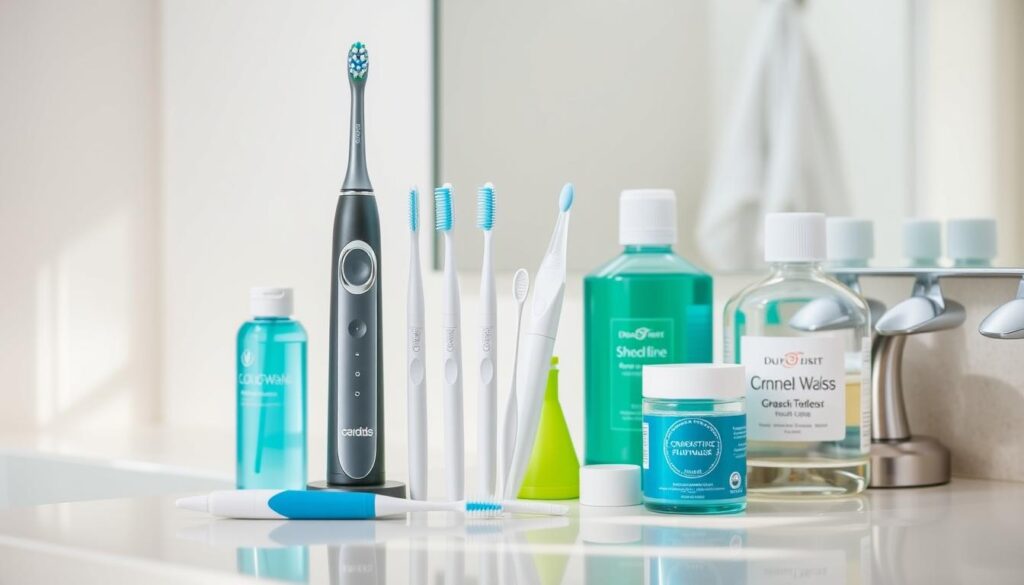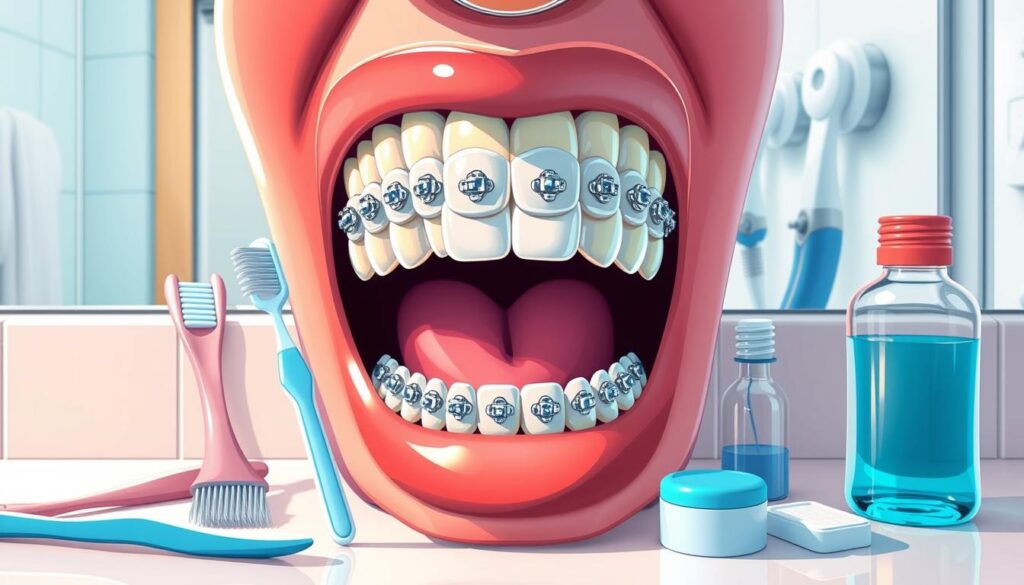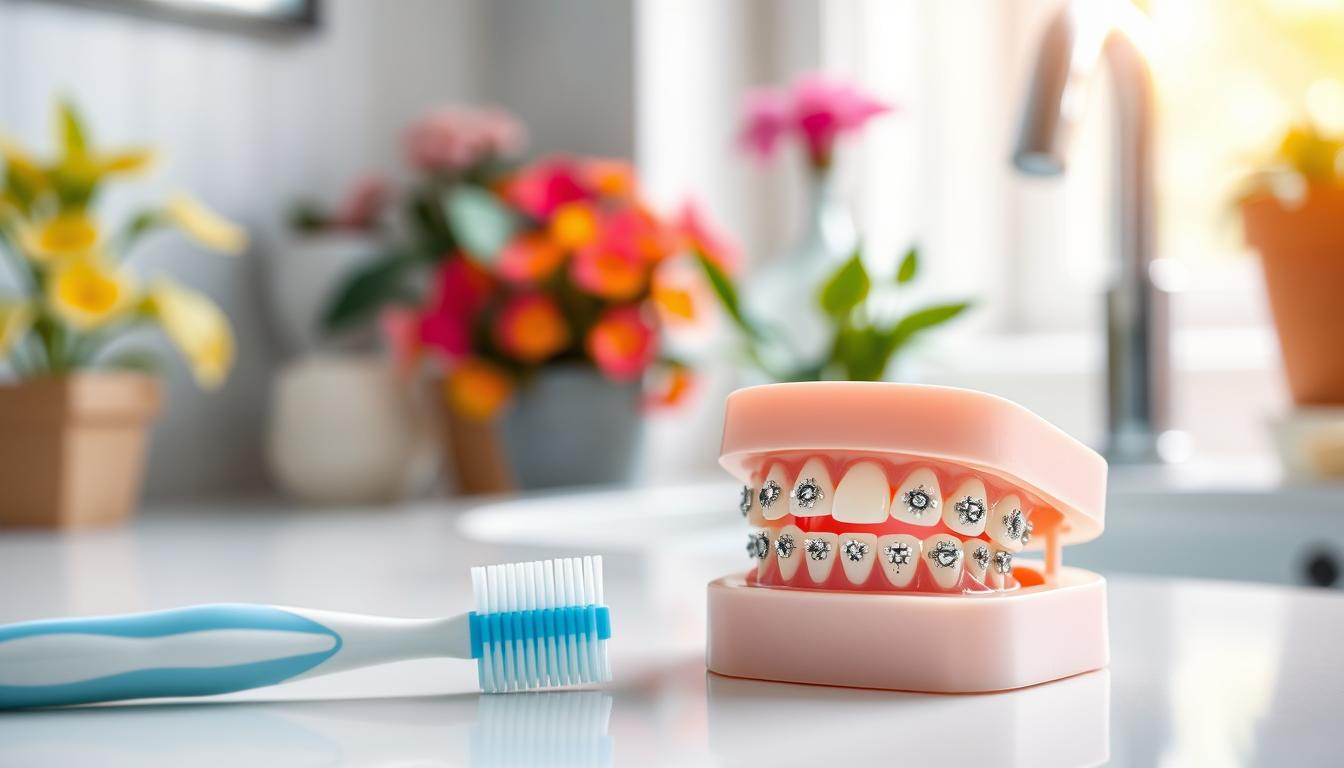Wearing braces doesn’t mean you’ll always have bad breath. To avoid bad breath, you need good oral care and hygiene. Braces make it harder to keep your mouth fresh because of all the places bacteria can hide.
Experts say braces make dental care harder. The metal parts trap food, causing bad smells. It’s important to prevent bad breath with braces to feel good about your smile and keep your teeth healthy.
Key Takeaways
- Braces require more intricate oral hygiene routines
- Daily thorough cleaning is essential for fresh breath
- Food particles create bacteria breeding grounds
- Specialized cleaning tools can help manage oral health
- Regular dental check-ups are critical during orthodontic treatment
Understanding Bad Breath with Braces: Causes and Concerns
Braces make it hard to keep your mouth clean. This can really affect how your breath smells. About half of people with braces get bad breath because of this.
Braces have lots of places for bacteria to grow. They trap food and cause bad smells. Knowing this helps you fight bad breath from braces.
Bacterial Growth in Orthodontic Environments
Braces have many spots for bacteria to live. The brackets and wires have tiny spaces for them. About 80% of bad breath comes from bacteria breaking down food.
Common Sources of Orthodontic Halitosis
- Food particles trapped between brackets
- Reduced saliva flow around orthodontic hardware
- Difficult-to-clean metal components
- Increased plaque accumulation
Impact of Food Particles and Plaque Buildup
Dental plaque grows fast on braces. It can start in just 24 hours if not cleaned. This plaque leads to bacteria and bad breath.
| Bacterial Growth Factor | Impact Percentage |
|---|---|
| Trapped Food Particles | 65% |
| Reduced Oral Cleaning Effectiveness | 55% |
| Plaque Accumulation | 75% |
Maintaining excellent oral hygiene is not just about preventing bad breath – it’s about protecting your overall dental health during orthodontic treatment.
Pro tip for tips to avoid bad breath from braces: Invest in specialized cleaning tools designed specifically for orthodontic patients to effectively remove bacteria and food particles.
Essential Daily Oral Hygiene Practices for Braces Wearers

Keeping your mouth clean is very important with braces. To avoid bad breath, you need to take good care of your teeth every day. Braces make it harder to clean your teeth because of their shape.
“Effective oral hygiene is the key to preventing braces bad breath and maintaining a healthy smile during orthodontic treatment.”
Here are the key steps to keep your breath fresh with braces:
- Brush after every meal for at least two minutes
- Use a soft-bristled toothbrush made for braces
- Put a small amount of fluoride toothpaste on your toothbrush
- Be gentle when cleaning around brackets and wires
How you brush is very important. Dentists say you should spend about 6 minutes brushing. Angle your toothbrush at 45 degrees to get around brackets well.
Flossing is even more crucial with braces. Here are some tools you might need:
- Floss threaders to get past wires
- Water flossers that remove almost all plaque
- Interdental brushes for hard spots
More tips for fresh breath include:
- Rinse with mouthwash that doesn’t have alcohol every night
- Drink lots of water to help make saliva
- Chew sugar-free gum after meals
- Clean your tongue to cut down on bacteria
Following these steps can help a lot in keeping your breath fresh and your teeth healthy while you have braces.
How to Prevent Braces Bad Breath: Professional Tips and Techniques
Keeping your breath fresh with braces needs a smart plan for cleaning your mouth. Dentists suggest special ways to stop bad breath and keep your teeth and gums healthy while you have braces.

Learning how to avoid bad breath with braces means knowing the best ways to clean and the right tools to use. Orthodontic experts say it’s key to clean your whole mouth well to avoid hygiene problems.
Advanced Brushing Techniques
Brushing well is very important with braces. Dentists suggest:
- Brush at a 45-degree angle to brackets
- Use soft-bristled toothbrushes
- Spend at least two minutes cleaning
- Brush after every meal when possible
Specialized Cleaning Tools for Braces
To stop bad breath with braces, get special cleaning tools:
- Interdental brushes for tight spaces
- Water flossers to remove trapped food
- Orthodontic-specific floss threaders
“Proper cleaning tools are your best defense against bad breath during orthodontic treatment.” – Dental Hygiene Association
Professional Cleaning Importance
Going to the dentist regularly is very for your mouth’s health. Professional cleanings get rid of hard plaque and tartar that cause bad breath. Most orthodontists say you should get cleanings every six months to check on your progress and avoid problems.
Remember, sticking to good oral hygiene is the main way to keep your breath smelling good and your smile bright during your orthodontic treatment.
Conclusion
Stopping bad breath with braces needs hard work and smart oral care. By using the tips in this guide, you can fight halitosis and keep your teeth healthy. How to prevent braces bad breath is more than just cleaning. It’s about knowing the special problems braces can cause.
Many people get cavities, with 90% of US adults and over 46% of kids affected. Keeping your mouth clean during orthodontic treatment is very important. Brushing after meals, using special tools, and staying away from foods that cause plaque are important steps.
Dentists say good oral care can lower risks from braces. Going to the dentist often, brushing right, and using tools like interdental brushes and fluoride mouthwash help. These steps keep your breath smelling good and your teeth strong during orthodontic treatment.
Finally, fighting bad breath with braces is good for your health and confidence. With effort, the right steps, and patience, you can get through orthodontic treatment with a fresh mouth and a bright smile.

